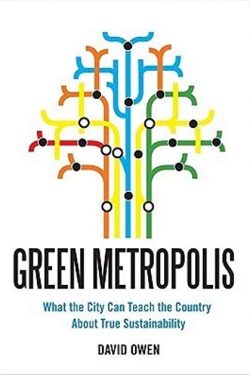In a persuasive and provocative challenge to established environmental thinking, David Owen’s GREEN METROPOLIS challenges much of the conventional wisdom about being green and shows how the greenest place in the United States isn’t Portland, Oregon, or Snowmass, Colorado, but New York, New York. Owen states that while most Americans view congested cities as environmental calamities, with their pollution, garbage, and gridlock, residents of dense urban environments individually drive, pollute, consume, and throw away less than other Americans. Residents of New York City–the most densely populated community in the U.S.–consume less electricity than the average inhabitants of any other part of the country, generate greenhouse gases at a level far below the national average, and rank last in gasoline consumption and first in use of public transportation.
David Owen’s GREEN METROPOLIS redefines what it means to be green, and offers vital insights into how to make our way to a more sustainable future: instead of depending on the acquisition of fancy new “green” gadgetry or the advent of new energy-related technologies, we should look to the lo-fi solutions already at work in dense cities around the globe.
David Owen
David Owen has been a staff writer for The New Yorker since 1991. Before joining The New Yorker, he was a contributing editor at The Atlantic Monthly, and prior to that, a senior writer at Harper’s and a frequent contributor to Esquire. He is also a contributing editor at Golf Digest and the author of several previous nonfiction books. He lives in northwest Connecticut with his wife, writer Ann Hodgman, and their two children.
